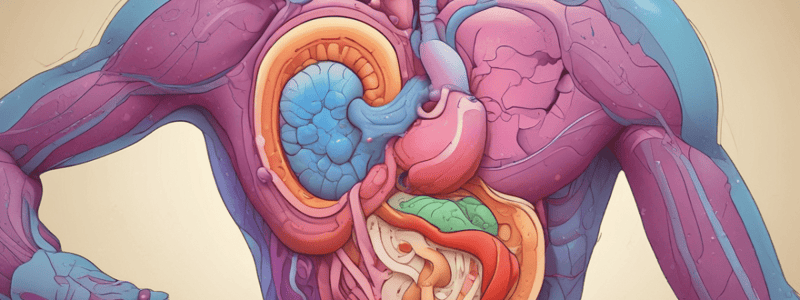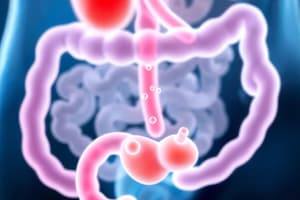Podcast
Questions and Answers
The ______ hormone is located in the stomach and is simulated by gastric juices secreting the smell and taste of food.
The ______ hormone is located in the stomach and is simulated by gastric juices secreting the smell and taste of food.
gastrin
The ______ hormone/enzyme is located in the stomach and production is simulated by gastrin and its function breaks down proteins into smaller peptides.
The ______ hormone/enzyme is located in the stomach and production is simulated by gastrin and its function breaks down proteins into smaller peptides.
pepsinogen/pepsin
The ______ acid hormone/enzyme is located in the stomach and is simulated by gastrin and its function is to creates a high acidic environment.
The ______ acid hormone/enzyme is located in the stomach and is simulated by gastrin and its function is to creates a high acidic environment.
hydrochloric
The ______ hormone/enzyme is located in the small intestines and is simulated by proteins and its function begins the breakdown of proteins into smaller peptides.
The ______ hormone/enzyme is located in the small intestines and is simulated by proteins and its function begins the breakdown of proteins into smaller peptides.
The ______ hormone/enzyme is located in the small intestines and is simulated by partially digested fats and starches and its function stimulates the pancreas to release pancreatic juice.
The ______ hormone/enzyme is located in the small intestines and is simulated by partially digested fats and starches and its function stimulates the pancreas to release pancreatic juice.
______ stimulates stomach cells to release gastrin, activates pepsinogens to become pepsin, and activates the production of mucous and hydrochloric acid.
______ stimulates stomach cells to release gastrin, activates pepsinogens to become pepsin, and activates the production of mucous and hydrochloric acid.
______ is simulated by gastric juices secreting the smell and taste of food.
______ is simulated by gastric juices secreting the smell and taste of food.
The function of ______ is to creates a high acidic environment that activates pepsinogens to become pepsin, kills bacteria, and helps in the absorption of certain vitamins and minerals.
The function of ______ is to creates a high acidic environment that activates pepsinogens to become pepsin, kills bacteria, and helps in the absorption of certain vitamins and minerals.
Match the following hormones/enzymes for digestion with their locations:
Match the following hormones/enzymes for digestion with their locations:
Match the following hormones/enzymes for digestion with their stimulators:
Match the following hormones/enzymes for digestion with their stimulators:
Match the following hormones/enzymes for digestion with their functions:
Match the following hormones/enzymes for digestion with their functions:
Match the following hormones/enzymes for digestion with their locations and functions:
Match the following hormones/enzymes for digestion with their locations and functions:
Match the following hormones/enzymes for digestion with their effects:
Match the following hormones/enzymes for digestion with their effects:
Match the following hormones/enzymes for digestion with their roles:
Match the following hormones/enzymes for digestion with their roles:
Match the following hormones/enzymes for digestion with their simulated production:
Match the following hormones/enzymes for digestion with their simulated production:
Match the following hormones/enzymes for digestion with their effects on the breakdown of proteins:
Match the following hormones/enzymes for digestion with their effects on the breakdown of proteins:
Gastrin is an enzyme located in the small intestines that stimulates the pancreas to release pancreatic juice.
Gastrin is an enzyme located in the small intestines that stimulates the pancreas to release pancreatic juice.
Pepsin is an enzyme that breaks down carbohydrates into simpler sugars.
Pepsin is an enzyme that breaks down carbohydrates into simpler sugars.
Hydrochloric acid creates a high alkaline environment in the stomach.
Hydrochloric acid creates a high alkaline environment in the stomach.
Rennin is an enzyme located in the stomach that breaks down carbohydrates.
Rennin is an enzyme located in the stomach that breaks down carbohydrates.
Secretin is a hormone that stimulates the stomach to release gastric juices.
Secretin is a hormone that stimulates the stomach to release gastric juices.
Gastrin stimulates the pancreas to release pancreatic juice.
Gastrin stimulates the pancreas to release pancreatic juice.
Pepsin is an enzyme that breaks down fats into fatty acids and glycerol.
Pepsin is an enzyme that breaks down fats into fatty acids and glycerol.
Hydrochloric acid is produced in the small intestines.
Hydrochloric acid is produced in the small intestines.
Flashcards are hidden until you start studying
Study Notes
Hormones and Enzymes for Digestion
Gastrin
- Located in the stomach
- Production is simulated by gastric juices secreting the smell and taste of food
- Stimulates stomach cells to release gastrin
- Activates pepsinogens to become pepsin
- Activates the production of mucous and hydrochloric acid
Pepsinogen/Pepsin
- Located in the stomach
- Production is simulated by gastrin
- Breaks down proteins into smaller peptides
Hydrochloric Acid
- Located in the stomach
- Production is simulated by gastrin
- Creates a high acidic environment that activates pepsinogens to become pepsin
- Kills bacteria
- Helps in the absorption of certain vitamins and minerals
Rennin
- Located in the small intestines
- Production is simulated by proteins
- Begins the breakdown of proteins into smaller peptides
Secretin
- Located in the small intestines
- Production is simulated by partially digested fats and starches
- Stimulates the pancreas to release pancreatic juice
- Pancreatic juice contains enzymes that are responsible for the digestion of proteins, starches, and fats
Hormones and Enzymes for Digestion
Gastrin
- Located in the stomach
- Production is simulated by gastric juices secreting the smell and taste of food
- Stimulates stomach cells to release gastrin
- Activates pepsinogens to become pepsin
- Activates the production of mucous and hydrochloric acid
Pepsinogen/Pepsin
- Located in the stomach
- Production is simulated by gastrin
- Breaks down proteins into smaller peptides
Hydrochloric Acid
- Located in the stomach
- Production is simulated by gastrin
- Creates a high acidic environment that activates pepsinogens to become pepsin
- Kills bacteria
- Helps in the absorption of certain vitamins and minerals
Rennin
- Located in the small intestines
- Production is simulated by proteins
- Begins the breakdown of proteins into smaller peptides
Secretin
- Located in the small intestines
- Production is simulated by partially digested fats and starches
- Stimulates the pancreas to release pancreatic juice
- Pancreatic juice contains enzymes that are responsible for the digestion of proteins, starches, and fats
Hormones and Enzymes for Digestion
Gastrin
- Located in the stomach
- Production is simulated by gastric juices secreting the smell and taste of food
- Stimulates stomach cells to release gastrin
- Activates pepsinogens to become pepsin
- Activates the production of mucous and hydrochloric acid
Pepsinogen/Pepsin
- Located in the stomach
- Production is simulated by gastrin
- Breaks down proteins into smaller peptides
Hydrochloric Acid
- Located in the stomach
- Production is simulated by gastrin
- Creates a high acidic environment that activates pepsinogens to become pepsin
- Kills bacteria
- Helps in the absorption of certain vitamins and minerals
Rennin
- Located in the small intestines
- Production is simulated by proteins
- Begins the breakdown of proteins into smaller peptides
Secretin
- Located in the small intestines
- Production is simulated by partially digested fats and starches
- Stimulates the pancreas to release pancreatic juice
- Pancreatic juice contains enzymes that are responsible for the digestion of proteins, starches, and fats
Studying That Suits You
Use AI to generate personalized quizzes and flashcards to suit your learning preferences.




